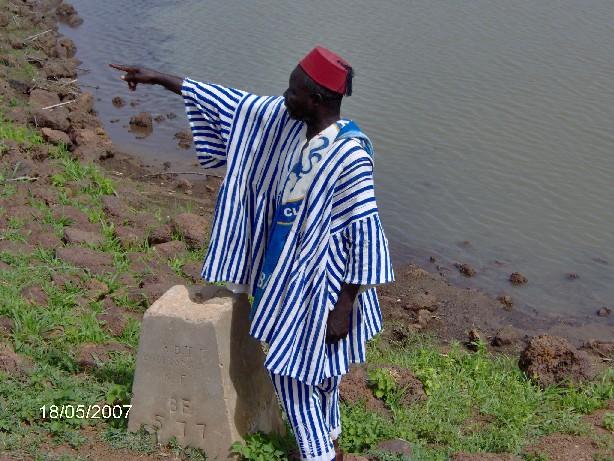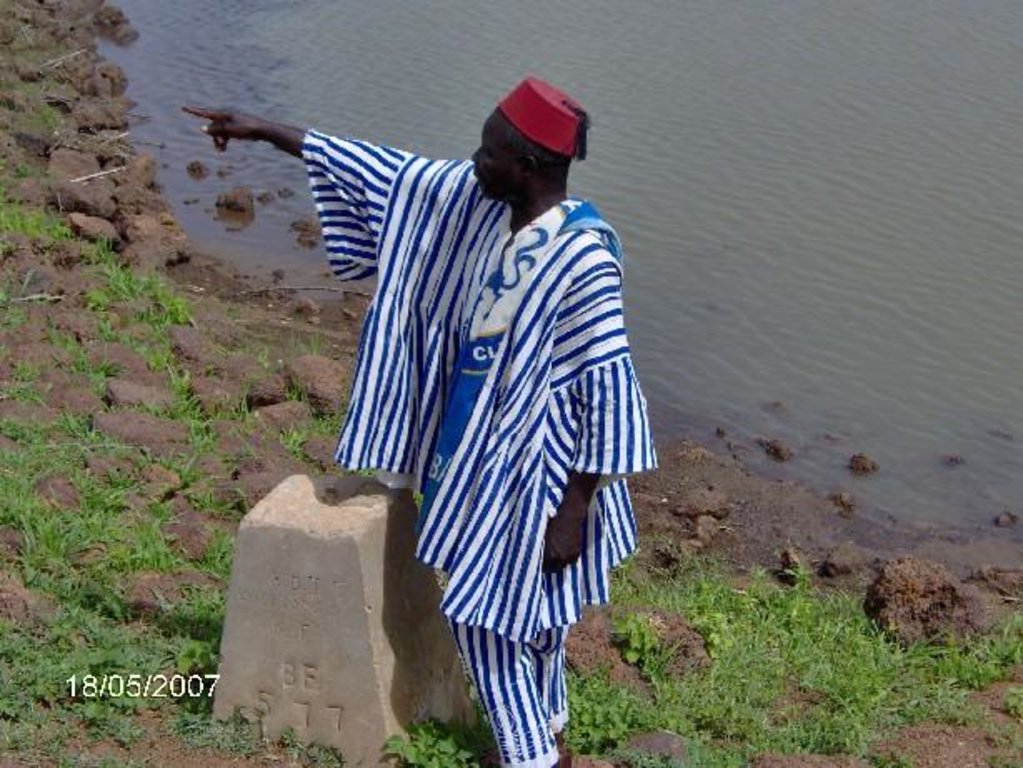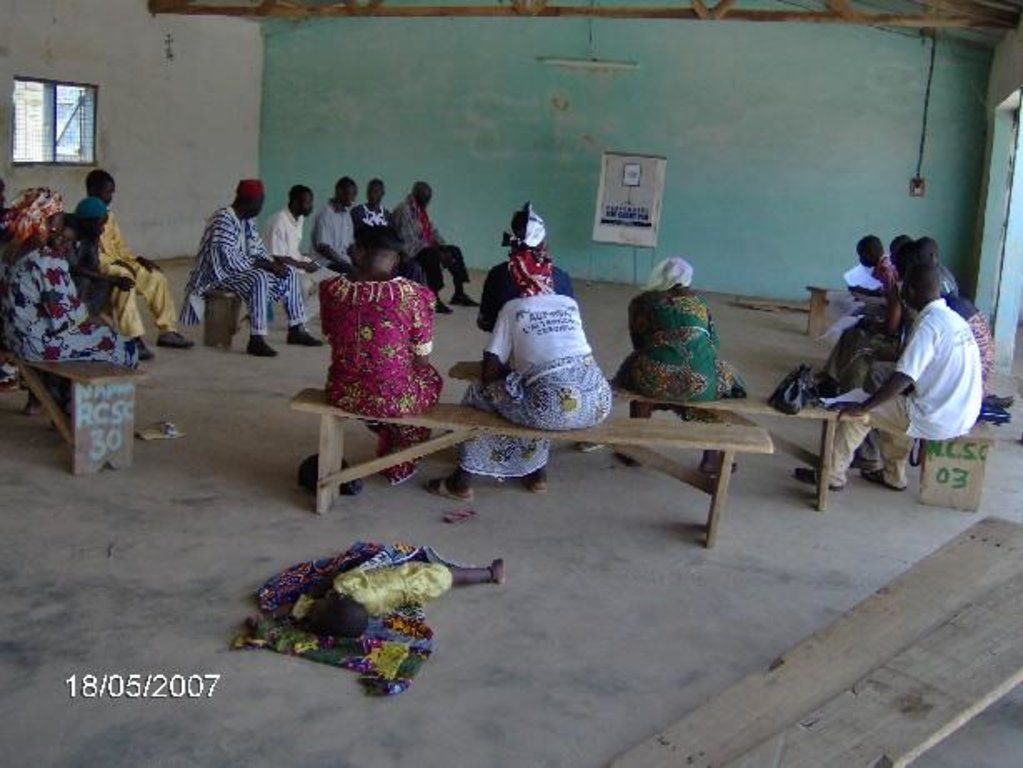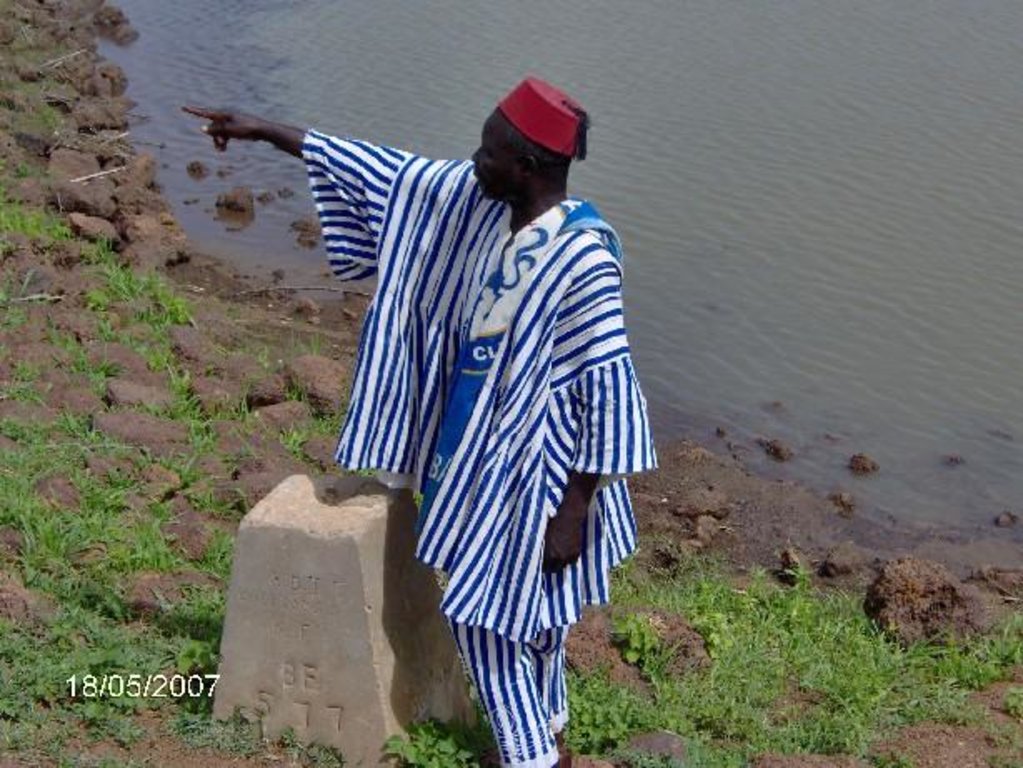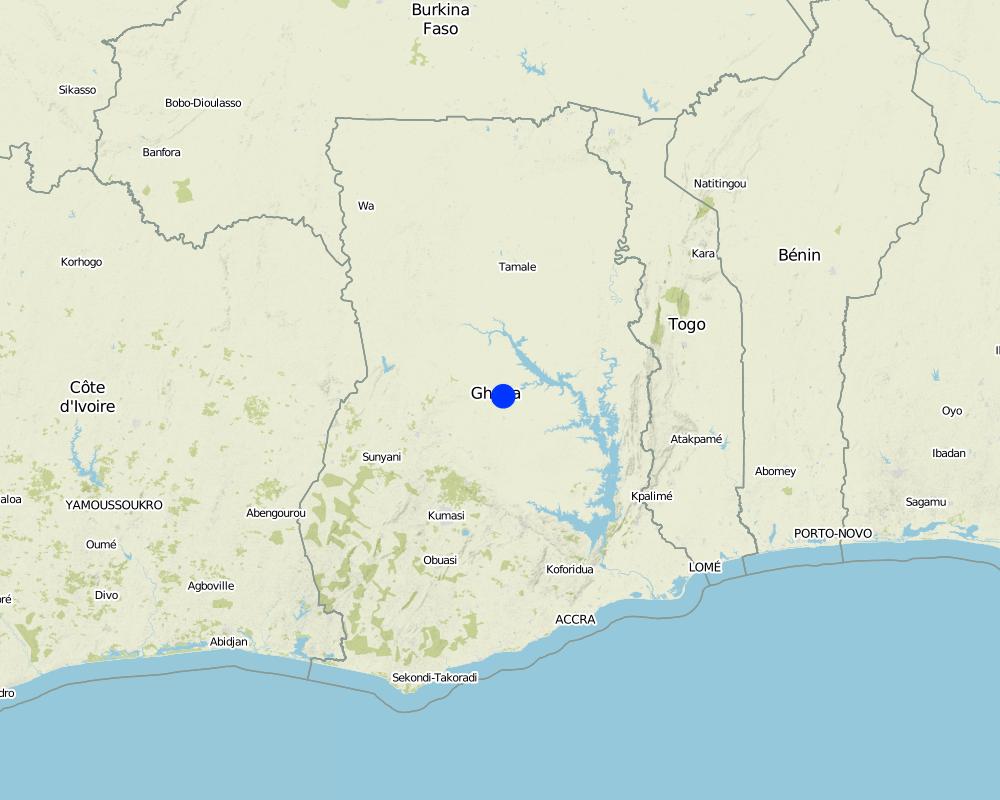Participatory Negotiated Territorial Development [Ghana]
- Creación:
- Actualización:
- Compilador: Philippe Zahner
- Editor: –
- Revisor: Fabian Ottiger
approaches_2570 - Ghana
Visualizar secciones
Expandir todo Colapsar todos1. Información general
1.2 Detalles de contacto de las personas de referencia e instituciones involucradas en la evaluación y la documentación del Enfoque
Especialista MST:
Groppo Paolo
paolo.groppo@fao.org
FAO
Rome
Italia
Especialista MST:
Cenerini Carolina
carolina.cenerini@fao.org
FAO
Rome
Italia
Nombre de la(s) institución(es) que facilitaron la documentación/ evaluación del Enfoque si fuera relevante)
Swiss Agency for Development and Cooperation (DEZA / COSUDE / DDC / SDC) - SuizaNombre de la(s) institución(es) que facilitaron la documentación/ evaluación del Enfoque si fuera relevante)
Food and Agriculture Organization of the United Nations (FAO) - Italia1.3 Condiciones referidas al uso de datos documentados mediante WOCAT
El compilador y la/s persona(s) de referencia claves aceptan las condiciones acerca del uso de los datos documentados mediante WOCAT :
Sí
2. Descripción del Enfoque MST
2.1 Breve descripción del Enfoque
Participatory Negotiated Territorial Development (PNTD) is a rural development approach developed by FAO.
2.2 Descripción detallada del Enfoque MST
Descripción detallada del Enfoque MST:
Aims / objectives: It offers a structure to build consensus among individual communities and development partners on natural resources/territorial management and development issues. PNTD facilitates consensus based planning within a team that represents different actors at different levels, including sector offices / technical services (agriculture, environment, etc.) and NGOs (involved in community-based rural development) at district/ department/ municipality level; and traditional authorities, user groups and associations at community/ village level.
Methods: During the diagnostic phase of the PNTD process, local territorial issues are analysed based on the viewpoints of the different actors and on a historical analysis. This step contributes to a coherent, shared understanding of the territorial system, thus providing the basis for collective agreements on development. These are referred to as Social Territorial Agreements. They are based on negotiation within the PNTD team. Main activities of PNTD include: (1) Facilitation of the planning process; (2) Provision of technical expertise; (3) Linkages to relevant institutions; (4) Technical advisory to assess viability and costs of joint development proposals; (5) Reporting back to communities and provision with final plans and resource maps; (6) Signing of ‘Social Territorial Agreements’ and endorsement by local government; (7) Establishment of a joint monitoring and evaluation system; and (8) Follow-up meetings between government institutions and NGOs.
Other important information: Independent external support by territorial facilitators is essential to assist in various aspects of the process. A PNTD approach was piloted within a project in the Onchocerciasis (riverblindess) Freed Zone along the Burkina Faso-Ghana border. This newly opened zone lacked a well defined, accepted management structure to support the development process, while cross-border aspects further complicated development, requiring cooperation among the communities and development partners from both countries. The PNTD team was supported by facilitators from the Netherlands Development Organisation (SNV). The team’s capacity to carry out inclusive planning processes has improved significantly, in terms of proposal development, negotiation and consensus building, and in placing the findings of the diagnostic phase in the larger geographical context. Joint development plans were elaborated and agreed upon from the perspective of the communities. FAO has been supporting the exercise through technical backstopping.
2.3 Fotos del Enfoque
2.5 País/ región/ lugares donde el Enfoque fue aplicado
País:
Ghana
Región/ Estado/ Provincia:
Ghana and Burkina Faso
Map
×2.7 Tipo de Enfoque
- proyecto/ basado en un programa
2.8 Propósitos/ objetivos principales del Enfoque
The Approach focused mainly on SLM with other activities (a road to link two communities directly)
Testing a PNTD approach for local (transboundary) territorial planning; Refining the methodological process; Preparing a joint development plan for the two areas in Ghana and Burkina Faso
The SLM Approach addressed the following problems: Limited commitment from central governments; Cross-border planning proved to be considerably more expensive than regular planning activities
3. Participación y roles de las partes interesadas involucradas
3.1 Partes interesadas involucradas en el Enfoque y sus roles
- usuarios locales de tierras/ comunidades locales
Community leaders
- ONG
SNV
- gobierno nacional (planificadores, autoridades)
- organización internacional
3.2 Involucramiento de los usuarios locales de tierras/ comunidades locales en las distintas fases del Enfoque
| Involucramiento de los usuarios locales de tierras/ comunidades locales | Especifique quién se involucró y describa las actividades | |
|---|---|---|
| iniciación/ motivación | ninguno | |
| planificación | ninguno | |
| implementación | ninguno | |
| monitoreo y evaluación | ninguno | |
| Research | ninguno |
4. Apoyo técnico, fortalecimiento institucional y gestión del conocimiento
4.1 Construcción de capacidades / capacitación
¿Se proporcionó la capacitación a usuarios de tierras/ otras partes interesadas?
Sí
Especifique quién fue capacitado:
- usuarios de tierras
- personal de campo/ consejeros
Forma de capacitación:
- en el contexto de trabajo
Temas avanzados:
Training focused on: (1) the PNTD process and its application in the context of cross-border natural resource management; (2) PRA tools relevant to the diagnostic phase; (3) participatory resource mapping (a tool to support the negotiation on development proposals)
4.2 Servicio de asesoría
¿Los usuarios de tierras tienen acceso a un servicio de asesoría?
Sí
Describa/ comentarios:
This approach focuses on establishing and maintaining social dialogue within the territory and restructuring and/or strengthening territorial institutions.
5. Financiamiento y apoyo material externo
5.2 Apoyo financiero/material proporcionado a los usuarios de tierras
¿Los usuarios de tierras recibieron financiamiento/ apoyo material para implementar la Tecnología/ Tecnologías? :
No
5.3 Subsidios para insumos específicos (incluyendo mano de obra)
- ninguno
Si la mano de obra de usuarios de tierras fue un insumo sustancial, ¿fue:
- voluntario?
Comentarios:
No subsidies were given. Labour was not rewarded and inputs were not financed by the project.
5.4 Crédito
¿Se proporcionó crédito bajo el Enfoque para actividades MST?
No
6. Análisis de impacto y comentarios de conclusión
6.1 Impactos del Enfoque
¿El Enfoque ayudó a los usuarios de tierras a implementar y mantener Tecnologías MST?
- No
- Sí, un poco
- Sí, moderadamente
- Sí, mucho
improved soil conservation and livestock rearing
Did other land users / projects adopt the Approach?
- No
- Sí, un poco
- Sí, moderadamente
- Sí, mucho
Invoked a high level of interest within the targeted communities; increased active participation, planning and consensus building capacity at community level
6.2 Motivación principal del usuario de la tierra para implementar MST
- prestigio, presión social/ cohesión social
avoiding potential transboundary conflicts
- conciencia medioambiental
improving natural resources and land management
6.3 Sostenibilidad de las actividades del Enfoque
¿Pueden los usuarios de tierras sostener lo que se implementó mediante el Enfoque (sin apoyo externo)?
- sí
Si respondió que sí, describa cómo:
The PNTD-approach has shown applicability. Yet, there are some aspects which need to be considered: (Local) governments need to take ownership of the cross-border planning and development processes. This could be realized by structuring external support differently: (1) Local government (districts, municipalities) supported by NGO’s are responsible to carry out all activities; (2) External (project) support focuses on overall coordination, the provision of technical advice, the provision of op
6.4 Fortalezas/ ventajas del Enfoque
| Fuerzas/ ventajas/ oportunidades desde la perspectiva del compilador o de otra persona de referencia clave |
|---|
| Provides a suitable framework for cross-border planning in the West African context |
| PNTD process raised the level of participation of local government institutions and NGO’s in a negotiated territorial development process through the PNTD team which comprised technical staff of these organizations. |
| PNTD enabled (and stimulated) the communities on both sides of the border to interact and joint development plans were elaborated and agreed upon from the perspective of the communities. |
| Looking beyond community boundaries, and consensus building between communities and stakeholders were new aspects of planning to the team members |
6.5 Debilidades/ desventajas del Enfoque y formas de sobreponerse a ellos
| Debilidades/ desventajas/ riesgos desde la perspectiva del compilador o de otra persona de referencia clave | ¿Cómo sobreponerse a ellas? |
|---|---|
| It took time for team members to grasp the conceptual approach of PNTD. They were used to working within individual communities, and if they were involved in planning then mostly at a diagnostic level. | |
| Language problems required almost continuous translation, and thus effectively doubling the time required | recruitment of linguistic mediator(s) need to be considered in the project budget |
7. Referencias y vínculos
7.1 Métodos/ fuentes de información
- visitas de campo, encuestas de campo
- entrevistas con usuarios de tierras
7.2 Referencias a publicaciones disponibles
Título, autor, año, ISBN:
FAO. 2005. An approach to rural development: Participatory and Negotiated Territorial Development (PNTD). Rural Development Division, FAO. OFZ Project (Socio Economic Development Programme for the Transborder Onchocerciasis Freed Zone of Burkina Faso and Ghana)
Título, autor, año, ISBN:
SNV Burkina Faso - SNV Ghana. 2007. X-border Participatory, Negotiated, Territorial Development (PNTD) – pilot phase report.
Vínculos y módulos
Expandir todo Colapsar todosVínculos
No hay vínculos
Módulos
No se hallaron módulos


